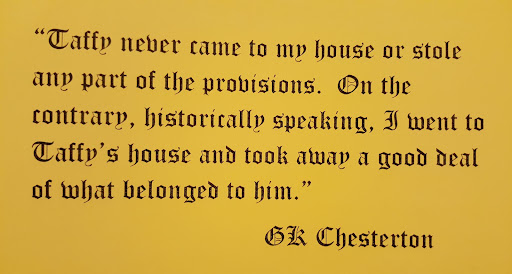The 3rd Annual GK Chesterton Pilgrimage has taken place! I hope to write a report shortly, until then here is Fr Schofield's Sermon from the Mass. (Photo shows, Father giving Pilgrims a Catholic history lesson on the way)
It gives me great pleasure to welcome
you once again to Uxbridge as you make this third Annual Chesterton Pilgrimage.
Your final destination is Beaconsfield
, G. K. Chesterton’s home from 1909 until his death in 1936. A year or so after
his wedding he and Frances went on an excursion which he described as ‘a
sort of second honeymoon’. He later recalled in his Autobiography:
I saw a passing omnibus labelled
“Hanwell” and, feeling this to be an appropriate omen [for Hanwell was the
location of a notorious lunatic asylum], we boarded it and left it somewhere at
a stray station, which I entered and asked the man in the ticket-office where
the next train went to. He uttered a pedantic reply, “Where do you want it to
go?” And I uttered the profound and philosophical rejoinder, “Wherever the next
train goes to.” It seemed that it went to Slough; which may seem to be singular
taste, even in a train. However, we went to Slough, and from there set out
walking with even less notion of where we were going.
Without intending to, he reached
Beaconsfield and realised that ‘this is the sort of place where someday
we will make our home’.
That passage is very telling.
Chesterton spent his life searching for the Truth. It involved, if you like,
catching trains without knowing exactly where they were going, trying different
routes, until he was led through agnosticism, sceptisicism, spiritualism and Anglicanism to the bosom of the
Catholic Church – in a humble room at the Railway Hotel in Beaconsfield, then
serving as the town's mission.
It was in Beaconsfield
that Chesterton lived, far away from Fleet Street; there that he wrote some of
his most famous works, and eventually there he died and was laid to rest.
Beaconsfield and Catholicism perhaps came to be closely-intertwined – they were
simply ‘home’.
Chesterton is still admired today not only for his writings but
his holiness of life. Many hope that one day he will be raised to the altars of
the Church. Perhaps the most appealing aspects of Chesterton’s holiness
were his wit and his humility. He was not just a ‘funny man’ but even developed
a sort of theology of Christian humour. He thought it very telling that ‘alone
among the animals, he [man] is shaken with the beautiful madness called
laughter.’ Humour was linked to an appreciation of reality, of truth. ‘Honesty
always laughs,’ he wrote, ‘because things are so laughable. Of course life is
a serious business and we cannot shrug off important matters with a smirk or a
laugh, but, on the other hand, to take everything seriously is to make
everything into an idol.’ Chesterton thought that a common theme in comedy is
‘the primary paradox that man is superior to all the things around him and yet
is at their mercy.’ Stand-up comedians are always observing the ridiculous side
of human existence. And if we have the sense of the ridiculous in the things
around us and, crucially, in ourselves then we are acknowledging that these
things are not the centre of the universe, that (in most cases) these matters
that consume so much of our time are passing away. Why can the angels fly?,
Chesterton famously asked. Because they take themselves so lightly.
Closely linked to this gift of joy,
this lightness of being is the virtue of humility. One of my favourite stories
with regard to this is told by Maisie Ward:
During the [1932 Dublin Eucharistic]
Congress an Eastern priest accosted G. K. with praise of his writings. His own
mind full of the great ideas of Christendom and the Faith, he felt a huge
disproportion in the allusion to himself. And when later the priest asked to be
photographed at his side it flashed through G.K.’s mind that he had heard in
the East that an idiot was supposed to bring luck.
Chesterton was a gentle giant, a man
with a sharp intellect but completely without guile, who gave his gifts freely
for the service of the Lord and knew exactly his place in the order of things.
Let us pray that we defend the Faith with the same wisdom and live our life
with the same innocence:
God Our Father, Thou didst fill the life of Thy servant Gilbert
Keith Chesterton with a sense of wonder and joy, and gave him a faith which was
the foundation of his ceaseless work, a charity towards all men, particularly
his opponents, and a hope which sprang from his lifelong gratitude for the gift
of human life. May his innocence and his laughter, his constancy in fighting
for the Christian faith in a world losing belief, his lifelong devotion to the
Blessed Virgin Mary and his love for all men, especially for the poor, bring
cheerfulness to those in despair, conviction and warmth to lukewarm believers
and the knowledge of God to those without faith. We beg Thee to grant the
favours we ask through his intercession, the end of abortion in this Country so
that his holiness may be recognised by all and the Church may proclaim him
Blessed. We ask this through Christ Our Lord. Amen.
Fr Schofield 30th July 2013


